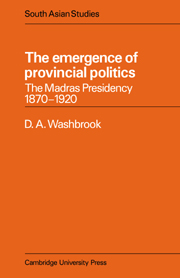Book contents
- Frontmatter
- Contents
- Preface
- Abbreviations, notes on references and spelling
- Introduction
- 1 The Madras Presidency
- 2 The governance of Madras
- 3 The political economy of Madras
- 4 Local structures of political power
- 5 The emergence of provincial politics
- 6 The vocabulary of communal politics
- 7 The Home Rule League, Justice Party and Congress
- Conclusion
- Glossary
- Bibliography
- Index
- Frontmatter
- Contents
- Preface
- Abbreviations, notes on references and spelling
- Introduction
- 1 The Madras Presidency
- 2 The governance of Madras
- 3 The political economy of Madras
- 4 Local structures of political power
- 5 The emergence of provincial politics
- 6 The vocabulary of communal politics
- 7 The Home Rule League, Justice Party and Congress
- Conclusion
- Glossary
- Bibliography
- Index
Summary
In 1917, the political life of Southern India appeared to undergo a massive transformation. Madras, known for thirty years as the most ‘benighted’ and conservative of the presidencies, suddenly exploded into political activity. The Home Rule League, organised from a suburb of Madras city, confronted the British with the most serious and largest movement of dissidence which their rule had faced anywhere in India since the Mutiny. The non–Brahman movement, also organised from the provincial capital, spread a wave of racial hatred across the presidency and threatened to tear Southern society apart into mutually antagonistic political communities. Both the Home Rule League agitation and the non–Brahman movement represented extremely new phenomena in Madras politics. Contemporaries never tired of pointing out how, just five years before they appeared, there was not the slightest sign of their imminence. And even a casual glance at the political debates and postures of 1912 would support this conclusion. In that year, the men (and women) who were to lead the Home Rule League were recognised generally as the most loyal supporters of the British raj; the later arch–ideologue of the non–Brahman cause was presenting to a Parliamentary Commission evidence which not even his enemies considered to show a trace of communal bias; and the provincial government of Madras was steadfastly denying to its superiors in London and New Delhi the existence of anything resembling communal conflict within its territories.
- Type
- Chapter
- Information
- The Emergence of Provincial PoliticsThe Madras Presidency 1870–1920, pp. 1 - 10Publisher: Cambridge University PressPrint publication year: 1976

